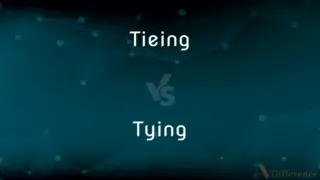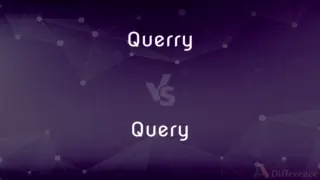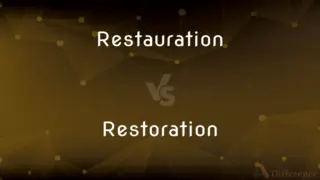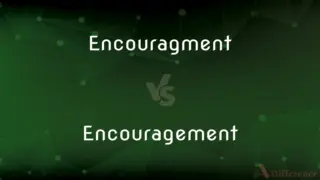Litterally vs. Literally — Which is Correct Spelling?
By Tayyaba Rehman — Updated on March 26, 2024
"Litterally" is incorrect, while "Literally" is correct. "Literally" means in a strict sense or without exaggeration.
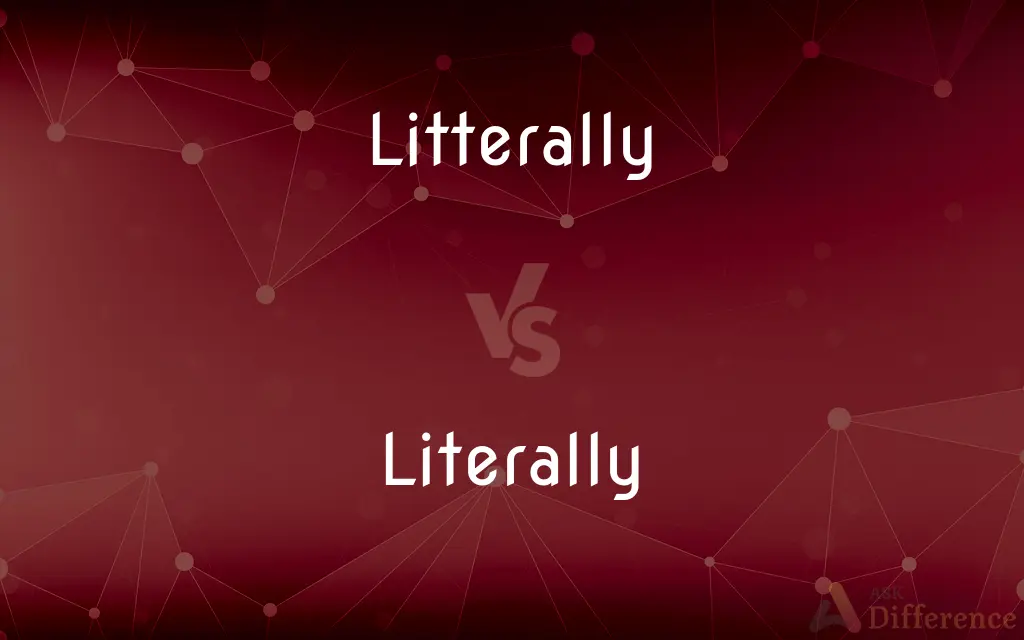
Table of Contents
Which is correct: Litterally or Literally
How to spell Literally?

Litterally
Incorrect Spelling

Literally
Correct Spelling
ADVERTISEMENT
Key Differences
Remember, "literally" has one "t" just like "literal."
Think of "literature", which starts similarly but doesn't double its consonants.
Use the phrase: "It's literal-ly correct, not litter-al."
Picture "literally" as a "lite" version; less weight, fewer "t's".
Remind yourself: "One tea (T) is enough, no littering with extras."
ADVERTISEMENT
How Do You Spell Literally Correctly?
Incorrect: I litterally can't believe what happened.
Correct: I literally can't believe what happened.
Incorrect: They were litterally walking in circles.
Correct: They were literally walking in circles.
Incorrect: He said he was so hungry he could eat a horse, but not litterally.
Correct: He said he was so hungry he could eat a horse, but not literally.
Incorrect: She was litterally the last person to leave.
Correct: She was literally the last person to leave.
Literally Definitions
"Literally" distinguishes facts from figurative or exaggerated expressions.
She literally worked day and night.
"Literally" emphasizes actual conditions or situations without figurative or metaphorical intent.
I was literally frozen with fear.
"Literally" means in a true and exact manner.
He was literally jumping with joy.
Used to accentuate a statement or description for effect, sometimes inaccurately.
There were literally a million people there.
In contemporary usage, "literally" can also intensify non-literal expressions.
My head is literally going to explode with all this information.
In a literal manner or sense; exactly
The driver took it literally when asked to go straight over the roundabout
Tiramisu, literally translated ‘pull-me-up’
In a literal manner; word for word
Translated the Greek passage literally.
In a literal or strict sense
Don't take my remarks literally.
Actually; in effect; practically. Used as an intensive to emphasize a figurative statement in an exaggerated way
“There are people in the world who literally do not know how to boil water” (Craig Claiborne). I was so angry that my heart literally exploded with rage.
Word for word; not figuratively; not as an idiom or metaphor.
When I saw on the news that there would be no school tomorrow because of the snowstorm, I literally jumped for joy, and hit my head on the ceiling fan.
Used non-literally as an intensifier for figurative statements: virtually, so to speak (often considered incorrect; see usage notes)
He was so surprised, he literally jumped twenty feet in the air.
My daughter's pet rabbit had babies, and now we've literally got rabbits coming out of our ears.
On 9/11 people were literally glued to their TV sets.
(colloquial) Used to intensify or dramatize non-figurative statements.
I had no idea, so I was literally guessing.
I was literally having breakfast when she arrived.
She was literally like, "What?", and I was literally like, "Yeah".
Literally who is this?
(colloquial) Used as a generic downtoner: just, merely.
It's not even hard to make—you literally just put it in the microwave for five minutes and it's done.
It won't take me long to get back, cause the store's literally two blocks away.
According to the primary and natural import of words; not figuratively; as, a man and his wife can not be literally one flesh.
With close adherence to words; word by word.
So wild and ungovernable a poet can not be translated literally.
In a literal sense;
Literally translated
He said so literally
(intensifier before a figurative expression) without exaggeration;
Our eyes were literally pinned to TV during the Gulf war
Literally Meaning in a Sentence
She was literally the only person who understood the assignment.
I was literally the last to know about the surprise party.
The book was so good, I literally read it in one sitting.
They literally built the house from the ground up.
The movie was so sad, I literally cried through the whole thing.
The town is so small, it's literally just one street.
He literally ran the entire marathon without stopping.
I literally bumped into my teacher at the grocery store.
I literally jumped out of my skin when I saw the spider.
My phone died, and I was literally lost without it.
He was so funny, I literally couldn't stop laughing.
The project was literally completed at the last minute.
I literally ate nothing but soup when I was sick.
The dog literally follows her everywhere she goes.
I've literally told you a thousand times (to correct the misuse: I've told you many times).
I literally can't start my day without coffee.
I literally spent the whole day cleaning the house.
I literally had the worst luck today.
The news was so shocking, I was literally speechless.
It was literally the coldest day of the year.
The concert was so loud, my ears were literally ringing afterwards.
It was so quiet, you could literally hear a pin drop.
The car literally broke down the day after the warranty expired.
We literally walked around the entire lake.
They literally had to start from scratch after the storm.
Literally Idioms & Phrases
Take literally
To understand words in their most basic sense without metaphor or exaggeration.
When she said she'd sleep for a week, I didn't take it literally.
Literally blown away
Extremely impressed or overwhelmed (often used figuratively).
I was literally blown away by the performance, even though I wasn't physically moved.
Literally see eye to eye
To agree completely (often used figuratively).
After the discussion, we literally saw eye to eye on the matter, finding common ground.
Literally on fire
Something is actually burning (often used figuratively to describe someone performing exceptionally well).
The building was literally on fire, requiring the fire department's immediate attention.
Common Curiosities
Why is it called Literally?
It derives from the word "literal", which means "exact or not exaggerated", emphasizing the truth of a statement.
What is the verb form of Literally?
"Literally" is an adverb and does not have a verb form.
What is the root word of Literally?
The root word is "literal".
What is the singular form of Literally?
"Literally" is an adverb and does not have a singular or plural form.
Which preposition is used with Literally?
Prepositions like "in", "by", or "with" can be used, depending on the context.
What is the pronunciation of Literally?
Literally is pronounced as /ˈlɪt.ər.əl.i/.
Is Literally a noun or adjective?
"Literally" is neither; it's an adverb.
What is the plural form of Literally?
"Literally" does not have a plural form.
Which vowel is used before Literally?
Typically, "a" is used as in "a literally amazing event".
Is the word Literally imperative?
No, "literally" is not imperative.
Is Literally an adverb?
Yes, "literally" is an adverb.
Is Literally an abstract noun?
No, "literally" is not an abstract noun.
Is Literally a vowel or consonant?
"Literally" is a word and contains both vowels and consonants.
What is the opposite of Literally?
The opposite could be "figuratively" or "metaphorically".
Which conjunction is used with Literally?
Any conjunction can be used with "literally" depending on the sentence; e.g., "and", "but", "or".
Is Literally a counLiterally noun?
"Literally" is an adverb and not a countable noun.
Is the word Literally a Gerund?
No, "literally" is not a gerund.
What part of speech is Literally?
"Literally" is an adverb.
What is another term for Literally?
Another term could be "actually" or "truly".
Is Literally a negative or positive word?
It is neutral; it's neither inherently negative nor positive.
How do we divide Literally into syllables?
Lit-er-al-ly.
Which article is used with Literally?
Articles are typically not used directly with "literally" as it is an adverb.
Is Literally a collective noun?
No, "literally" is not a collective noun.
Is the Literally term a metaphor?
"Literally" itself is not a metaphor but is often used in metaphorical contexts.
Is the word “Literally” a Direct object or an Indirect object?
"Literally" is an adverb and is typically neither a direct nor an indirect object.
How many syllables are in Literally?
"Literally" has four syllables.
What is a stressed syllable in Literally?
The first syllable, "Lit", is stressed.
Which determiner is used with Literally?
Determiners are typically not used directly with "literally".
How is Literally used in a sentence?
"She was literally on cloud nine after receiving the good news."
Share Your Discovery

Previous Comparison
Dispostion vs. Disposition
Next Comparison
Especific vs. SpecificAuthor Spotlight
Written by
Tayyaba RehmanTayyaba Rehman is a distinguished writer, currently serving as a primary contributor to askdifference.com. As a researcher in semantics and etymology, Tayyaba's passion for the complexity of languages and their distinctions has found a perfect home on the platform. Tayyaba delves into the intricacies of language, distinguishing between commonly confused words and phrases, thereby providing clarity for readers worldwide.

